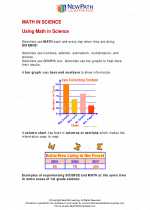Condensation
Condensation is the process by which water vapor in the air is changed into liquid water. This occurs when the air becomes saturated with water vapor and cannot hold any more, causing the vapor to condense into tiny water droplets. Condensation is a crucial part of the water cycle and is responsible for the formation of clouds, fog, and dew.
Key Points to Remember
- Condensation is the process of water vapor turning into liquid water.
- It occurs when the air becomes saturated with water vapor.
- Condensation is an important part of the water cycle.
- It leads to the formation of clouds, fog, and dew.
Study Guide
Here are some key concepts to understand about condensation:
- Water Vapor: What is water vapor and how does it differ from liquid water?
- Humidity: What is humidity and how does it relate to condensation?
- Cloud Formation: How does condensation lead to the formation of clouds?
- Everyday Examples: Identify and describe examples of condensation in everyday life (e.g., foggy windows, dew on grass).
- Importance: Why is condensation important for the environment and the water cycle?
Understanding condensation is essential for comprehending the water cycle and the role of water in our environment. By grasping the process of condensation, we can appreciate the formation of clouds, the occurrence of fog, and the presence of dew in the morning.
.◂Science Worksheets and Study Guides First Grade. Math in Science
Study Guide Math in Science - 1st grade level
Math in Science - 1st grade level  Worksheet/Answer key
Worksheet/Answer key Math in Science - 1st grade level
Math in Science - 1st grade level  Worksheet/Answer key
Worksheet/Answer key Math in Science - 1st grade level
Math in Science - 1st grade level  Worksheet/Answer key
Worksheet/Answer key Math in Science - 1st grade level
Math in Science - 1st grade level 

 Worksheet/Answer key
Worksheet/Answer key
 Worksheet/Answer key
Worksheet/Answer key
 Worksheet/Answer key
Worksheet/Answer key

The resources above cover the following skills:
EARTH AND SPACE SCIENCE
Earth’s Place in the Universe
Observe seasonal patterns of sunrise and sunset to describe the relationship between the number of hours of daylight and the time of year (e.g., more hours of daylight during summer as compared to winter).